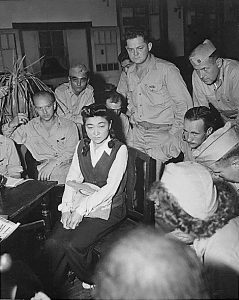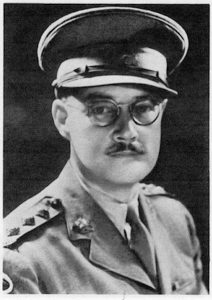- Author
- A.N. Other
- Subjects
- Biographies and personal histories, History - WW2
- Tags
-
- RAN Ships
- None noted.
- Publication
- June 2013 edition of the Naval Historical Review (all rights reserved)
What’s in a name? That which we call a rose
By any other name would smell as sweet.
Shakespeare’s enduring couplet from Romeo and Juliet, now often shortened to ‘a rose by any other name’, reminds us of a rose which became synonymous with Japanese propaganda used against Allied forces during WW II. Tokyo Rose was the name given by Allied servicemen to a then unknown female who broadcast sympathetic messages in English and played popular western music aimed at Allied forces fighting in the Pacific.
Following the Japanese unconditional surrender in September 1945 General MacArthur headed an army of occupation taking control of all forms of government including the media. The new authorities were keen to know of personnel, especially foreign nationals, involved in war-time propaganda broadcasts as some of these could be guilty of serious crimes. High on this list was Tokyo Rose whose friendly voice had a wide audience amongst Allied servicemen and civilians.
Iva Ikuko Toguri
When eventually discovered Tokyo Rose proved to be a sad and demure small woman of mixed Japanese and European ancestry who, with her black plaits, looked younger than her 30 years. Iva Ikuko Toguri was born in Los Angeles on 4 July 1916, the daughter of Japanese immigrants. She was bilingual, brought up in the Christian faith, an excellent student who graduated from the University of California. In July 1941 as a family representative she sailed for Japan to visit her aunt who was seriously ill. She travelled legally on a US Certificate of Identification as she did not have a passport. In Japan she applied through the US Consulate for a passport stating she now wished to return home. This request was forwarded to the State Department but during processing was overtaken by events unfolding at Pearl Harbor on 7 December 1941.
When war came Iva’s travel documents were said to be incomplete and she was stranded in Japan. Here she was pressured to renounce her American citizenship, but this she refused; as a result she was declared an enemy alien and denied an all-important ration card. To support herself she managed to gain employment as a typist for Radio Tokyo. Radio Tokyo devised an English language program known as ‘Zero Hour’ to broadcast light entertainment, especially propaganda tinged skits, slanted news reports and popular western music aimed at Allied servicemen with the intent of undermining morale. The program was produced by some Allied prisoners of war who, possibly under duress, had been persuaded to this cause. Senior amongst this group was Major Charles Cousens. In looking for suitable bilingual presenters, Cousens discovered Iva with her genuine American accent and groomed her for the show. Under the stage name of ‘Orphan Annie’ Iva performed in comedy sketches and introduced recorded music in 15 to 20 minute segments of the program, but she did not directly participate in newscasts.
Some personal anecdotes from these times come from some of our more senior members. One who served in a cruiser recalls that members of the wardroom were discouraged from listening to Tokyo Radio but somehow the mess-decks were aware of the seductively voiced young lady who told of Japanese gains and Allied losses, which at times included their own ship.

At the other end of the spectrum another member, serving in primitive conditions in a small Darwin based Fairmile patrol boat operating in the Timor and Arafura Seas, recalls tuning into Tokyo Rose using a short-wave radio provided by money from the ‘Comforts Fund’. Tokyo Rose’s broadcasts could be upsetting with such messages as: ‘…while you boys are fighting in the stinky tropics, thousands of Yanks in Sydney and Melbourne with money running out of their pockets are taking out your wives, sisters and girlfriends and lavishing expensive presents on them’, or some such words.
On 19 April 1945 Iva married Felipe D’Aquino, a Portuguese employed by a Japanese newsagency. After her discovery Iva was detained by the US Military for a year before being released for lack of evidence. However when she returned to America the Federal Bureau of Investigation looked into her wartime activities and she was charged with eight counts of treason. In her 1949 trial only one charge was proved on which she was fined $10,000 and sentenced to ten years imprisonment. She was paroled after six years and moved to Chicago. Much later, investigating journalists found that key witnesses had been coerced into giving false evidence at Iva’s trial. In 1977 she was pardoned by US President Gerald Ford. She died of natural causes in Chicago on 26 September 2006, aged 90.
Charles Hughes Cousens
Charles Cousens was born in Poona, India on 26 August 1903, the son of a British Army officer. He followed the family tradition into the Army but in 1927 resigned his commission and worked his way to Australia. Here he took a number of part-time jobs before finding his niche as a radio announcer with 2GB. The quality of his voice together with a pleasant personality made him a success. His best known program was ‘Radio Newspaper of the Air’ which especially appealed to younger people.
Cousens volunteered to join the AIF and was commissioned as a Captain in July 1940 just short of his 37th birthday. Given his recent background he might have been expected to take a possibly easier path with the Army Information Service, but instead he commanded a rifle company then serving in Malaya.

Here he saw service against the Japanese and was badly burned. On 13 February 1942, two days before the surrender of Singapore, he was promoted Temporary Major. As a prisoner the Japanese discovered Cousens had worked in radio but he refused to work on their behalf in Singapore. In July he was shipped to Tokyo where, as he would claim, under threats of orture and death he was encouraged to write propaganda scripts and coach English speaking announcers in western broadcasting techniques. He joined the production staff of ‘Zero Hour’ and presented some news services.
The respected Australian war correspondent, Lachlan McDonald, who had covered the war throughout southeast Asia and was accredited to MacArthur’s staff knew Cousens. McDonald had visited HMS Speaker, one of the smaller carriers which was amongst ships taking Commonwealth ex-prisoners of war to Manila where they received medical checks and treatment before being repatriated to their home
countries. When seeking interviews with the POWs McDonald came across Cousens who was officer commanding the contingent. Cousens was denounced and returned to Australia under arrest where he was charged with the capital offence of treason.
The final curtain
The high profile case against Cousens was socially divisive. There were those who believed him, despite duress, to be a traitor and wanted him tried. Others, who thought we had had enough of war, especially wished to forget the shame and suffering of Singapore. At the political level questions might be asked, such as was the national interest better served by not raking through these events. Cousens was committed for trial but the charge was later dropped because of unsound evidence.
Cousens was never court-martialled but in January 1947 he was stripped of his commission. Despite this, three months later, his old comrades invited him to lead them on the Anzac Day march through Sydney.
He was welcomed back to 2GB and afterwards worked in television. In 1949 he went to San Francisco and appeared as a defence witness for Iva Toguri, who was goaled for treason. Cousens died at his Sydney home on 9 May 1964 aged 60.
A final tribute acknowledging the success of Tokyo Rose belongs to the United States Army Radio Network, who possibly less knowledgeable of Shakespearian verse, established a counter program known as ‘Tokyo Mose’ which was said to be very popular amongst younger Japanese listeners.




